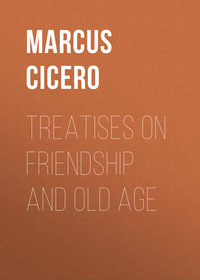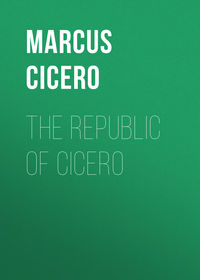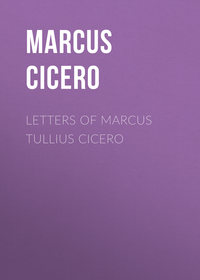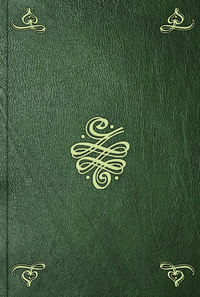 полная версия
полная версияCicero's Tusculan Disputations
189XXV. A mind employed on such subjects, and which night and day contemplates them, contains in itself that precept of the Delphic God, so as to “know itself,” and to perceive its connection with the divine reason, from whence it is filled with an insatiable joy. For reflections on the power and nature of the Gods raise in us a desire of imitating their eternity. Nor does the mind, that sees the necessary dependences and connections that one cause has with another, think it possible that it should be itself confined to the shortness of this life. Those causes, though they proceed from eternity to eternity, are governed by reason and understanding. And he who beholds them and examines them, or rather he whose view takes in all the parts and boundaries of things, with what tranquillity of mind does he look on all human affairs, and on all that is nearer him! Hence proceeds the knowledge of virtue; hence arise the kinds and species of virtues; hence are discovered those things which nature regards as the bounds and extremities of good and evil; by this it is discovered to what all duties ought to be referred, and which is the most eligible manner of life. And when these and similar points have been investigated, the principal consequence which is deduced from them, and that which is our main object in this discussion, is the establishment of the point, that virtue is of itself sufficient to a happy life.
The third qualification of our wise man is the next to be considered, which goes through and spreads itself over every part of wisdom; it is that whereby we define each particular thing, distinguish the genus from its species, connect consequences, draw just conclusions, and distinguish truth from falsehood, which is the very art and science of disputing; which is not only of the greatest use in the examination of what passes in the world, but is likewise the most rational entertainment, and that which is most becoming to true wisdom. Such are its effects in retirement. Now, let our wise man be considered as protecting the republic; what can be more excellent than such a character? By his prudence he will discover the true interests of his fellow-citizens; by his justice he will be prevented from applying what belongs to the public to his own use; and, in short, he will be ever governed by all the 190virtues, which are many and various. To these let us add the advantage of his friendships; in which the learned reckon not only a natural harmony and agreement of sentiments throughout the conduct of life, but the utmost pleasure and satisfaction in conversing and passing our time constantly with one another. What can be wanting to such a life as this to make it more happy than it is? Fortune herself must yield to a life stored with such joys. Now, if it be a happiness to rejoice in such goods of the mind, that is to say, in such virtues, and if all wise men enjoy thoroughly these pleasures, it must necessarily be granted that all such are happy.
XXVI. A. What, when in torments and on the rack?
M. Do you imagine I am speaking of him as laid on roses and violets? Is it allowable even for Epicurus (who only puts on the appearance of being a philosopher, and who himself assumed that name for himself) to say (though, as matters stand, I commend him for his saying) that a wise man might at all times cry out, though he be burned, tortured, cut to pieces, “How little I regard it!” Shall this be said by one who defines all evil as pain, and measures every good by pleasure; who could ridicule whatever we call either honorable or base, and could declare of us that we were employed about words, and uttering mere empty sounds; and that nothing is to be regarded by us but as it is perceived to be smooth or rough by the body? What! shall such a man as this, as I said, whose understanding is little superior to the beasts’, be at liberty to forget himself; and not only to despise fortune, when the whole of his good and evil is in the power of fortune, but to say that he is happy in the most racking torture, when he had actually declared pain to be not only the greatest evil, but the only one? Nor did he take any trouble to provide himself with those remedies which might have enabled him to bear pain, such as firmness of mind, a shame of doing anything base, exercise, and the habit of patience, precepts of courage, and a manly hardiness; but he says that he supports himself on the single recollection of past pleasures, as if any one, when the weather was so hot as that he was scarcely able to bear it, should comfort himself by recollecting that he was once in my country, 191Arpinum, where he was surrounded on every side by cooling streams. For I do not apprehend how past pleasures can allay present evils. But when he says that a wise man is always happy who would have no right to say so if he were consistent with himself, what may they not do who allow nothing to be desirable, nothing to be looked on as good but what is honorable? Let, then, the Peripatetics and Old Academics follow my example, and at length leave off muttering to themselves; and openly and with a clear voice let them be bold to say that a happy life may not be inconsistent with the agonies of Phalaris’s bull.
XXVII. But to dismiss the subtleties of the Stoics, which I am sensible I have employed more than was necessary, let us admit of three kinds of goods; and let them really be kinds of goods, provided no regard is had to the body and to external circumstances, as entitled to the appellation of good in any other sense than because we are obliged to use them: but let those other divine goods spread themselves far in every direction, and reach the very heavens. Why, then, may I not call him happy, nay, the happiest of men, who has attained them? Shall a wise man be afraid of pain? which is, indeed, the greatest enemy to our opinion. For I am persuaded that we are prepared and fortified sufficiently, by the disputations of the foregoing days, against our own death or that of our friends, against grief, and the other perturbations of the mind. But pain seems to be the sharpest adversary of virtue; that it is which menaces us with burning torches; that it is which threatens to crush our fortitude, and greatness of mind, and patience. Shall virtue, then, yield to this? Shall the happy life of a wise and consistent man succumb to this? Good. Gods! how base would this be! Spartan boys will bear to have their bodies torn by rods without uttering a groan. I myself have seen at Lacedæmon troops of young men, with incredible earnestness contending together with their hands and feet, with their teeth and nails, nay, even ready to expire, rather than own themselves conquered. Is any country of barbarians more uncivilized or desolate than India? Yet they have among them some that are held for wise men, who never wear any clothes all their life long, and who bear the 192snow of Caucasus, and the piercing cold of winter, without any pain; and who if they come in contact with fire endure being burned without a groan. The women, too, in India, on the death of their husbands have a regular contest, and apply to the judge to have it determined which of them was best beloved by him; for it is customary there for one man to have many wives. She in whose favor it is determined exults greatly, and being attended by her relations, is laid on the funeral pile with her husband; the others, who are postponed, walk away very much dejected. Custom can never be superior to nature, for nature is never to be got the better of. But our minds are infected by sloth and idleness, and luxury, and languor, and indolence: we have enervated them by opinions and bad customs. Who is there who is unacquainted with the customs of the Egyptians? Their minds being tainted by pernicious opinions, they are ready to bear any torture rather than hurt an ibis, a snake, a cat, a dog, or a crocodile; and should any one inadvertently have hurt any of these animals, he will submit to any punishment. I am speaking of men only. As to the beasts, do they not bear cold and hunger, running about in woods, and on mountains and deserts? Will they not fight for their young ones till they are wounded? Are they afraid of any attacks or blows? I mention not what the ambitious will suffer for honor’s sake, or those who are desirous of praise on account of glory, or lovers to gratify their lust. Life is full of such instances.
XXVIII. But let us not dwell too much on these questions, but rather let us return to our subject. I say, and say again, that happiness will submit even to be tormented; and that in pursuit of justice, and temperance, and still more especially and principally fortitude, and greatness of soul, and patience, it will not stop short at sight of the executioner; and when all other virtues proceed calmly to the torture, that one will never halt, as I said, on the outside and threshold of the prison; for what can be baser, what can carry a worse appearance, than to be left alone, separated from those beautiful attendants? Not, however, that this is by any means possible; for neither can the virtues hold together without happiness, nor happiness 193without the virtues; so that they will not suffer her to desert them, but will carry her along with them, to whatever torments, to whatever pain they are led. For it is the peculiar quality of a wise man to do nothing that he may repent of, nothing against his inclination, but always to act nobly, with constancy, gravity, and honesty; to depend on nothing as certainty; to wonder at nothing, when it falls out, as if it appeared strange and unexpected to him; to be independent of every one, and abide by his own opinion. For my part, I cannot form an idea of anything happier than this. The conclusion of the Stoics is indeed easy; for since they are persuaded that the end of good is to live agreeably to nature, and to be consistent with that—as a wise man should do so, not only because it is his duty, but because it is in his power—it must, of course, follow that whoever has the chief good in his power has his happiness so too. And thus the life of a wise man is always happy. You have here what I think may be confidently said of a happy life; and as things now stand, very truly also, unless you can advance something better.
XXIX. A. Indeed I cannot; but I should be glad to prevail on you, unless it is troublesome (as you are under no confinement from obligations to any particular sect, but gather from all of them whatever strikes you most as having the appearance of probability), as you just now seemed to advise the Peripatetics and the Old Academy boldly to speak out without reserve, “that wise men are always the happiest”—I should be glad to hear how you think it consistent for them to say so, when you have said so much against that opinion, and the conclusions of the Stoics.
M. I will make use, then, of that liberty which no one has the privilege of using in philosophy but those of our school, whose discourses determine nothing, but take in everything, leaving them unsupported by the authority of any particular person, to be judged of by others, according to their weight. And as you seem desirous of knowing how it is that, notwithstanding the different opinions of philosophers with regard to the ends of goods, virtue has still sufficient security for the effecting of a happy life—which security, as we are informed, Carneades used indeed to dispute against; but he disputed as against the 194Stoics, whose opinions he combated with great zeal and vehemence. I, however, shall handle the question with more temper; for if the Stoics have rightly settled the ends of goods, the affair is at an end; for a wise man must necessarily be always happy. But let us examine, if we can, the particular opinions of the others, that so this excellent decision, if I may so call it, in favor of a happy life, may be agreeable to the opinions and discipline of all.
XXX. These, then, are the opinions, as I think, that are held and defended—the first four are simple ones: “that nothing is good but what is honest,” according to the Stoics; “nothing good but pleasure,” as Epicurus maintains; “nothing good but a freedom from pain,” as Hieronymus62 asserts; “nothing good but an enjoyment of the principal, or all, or the greatest goods of nature,” as Carneades maintained against the Stoics—these are simple, the others are mixed propositions. Then there are three kinds of goods: the greatest being those of the mind; the next best those of the body; the third are external goods, as the Peripatetics call them, and the Old Academics differ very little from them. Dinomachus63 and Callipho64 have coupled pleasure with honesty; but Diodorus65 the Peripatetic has joined indolence to honesty. These are the opinions that have some footing; for those of Aristo,66 Pyrrho,67 Herillus,68 and of some others, are quite out of date. Now let us see what weight these men have in 195them, excepting the Stoics, whose opinion I think I have sufficiently defended; and indeed I have explained what the Peripatetics have to say; excepting that Theophrastus, and those who followed him, dread and abhor pain in too weak a manner. The others may go on to exaggerate the gravity and dignity of virtue, as usual; and then, after they have extolled it to the skies, with the usual extravagance of good orators, it is easy to reduce the other topics to nothing by comparison, and to hold them up to contempt. They who think that praise deserves to be sought after, even at the expense of pain, are not at liberty to deny those men to be happy who have obtained it. Though they may be under some evils, yet this name of happy has a very wide application.
XXXI. For even as trading is said to be lucrative, and farming advantageous, not because the one never meets with any loss, nor the other with any damage from the inclemency of the weather, but because they succeed in general; so life may be properly called happy, not from its being entirely made up of good things, but because it abounds with these to a great and considerable degree. By this way of reasoning, then, a happy life may attend virtue even to the moment of execution; nay, may descend with her into Phalaris’s bull, according to Aristotle, Xenocrates, Speusippus, Polemon; and will not be gained over by any allurements to forsake her. Of the same opinion will Calliphon and Diodorus be; for they are both of them such friends to virtue as to think that all things should be discarded and far removed that are incompatible with it. The rest seem to be more hampered with these doctrines, but yet they get clear of them; such as Epicurus, Hieronymus, and whoever else thinks it worth while to defend the deserted Carneades: for there is not one of them who does not think the mind to be judge of those goods, and able sufficiently to instruct him how to despise what has the appearance only of good or evil. For what seems to you to be the case with Epicurus is the case also with Hieronymus and Carneades, and, indeed, with all the rest of them; for who is there who is not sufficiently prepared against death and pain? I will begin, with your leave, with him whom we call soft and voluptuous. What! 196does he seem, to you to be afraid of death or pain when he calls the day of his death happy; and who, when he is afflicted by the greatest pains, silences them all by recollecting arguments of his own discovering? And this is not done in such a manner as to give room for imagining that he talks thus wildly from some sudden impulse; but his opinion of death is, that on the dissolution of the animal all sense is lost; and what is deprived of sense is, as he thinks, what we have no concern at all with. And as to pain, too, he has certain rules to follow then: if it be great, the comfort is that it must be short; if it be of long continuance, then it must be supportable. What, then? Do those grandiloquent gentlemen state anything better than Epicurus in opposition to these two things which distress us the most? And as to other things, do not Epicurus and the rest of the philosophers seem sufficiently prepared? Who is there who does not dread poverty? And yet no true philosopher ever can dread it.
XXXII. But with how little is this man himself satisfied! No one has said more on frugality. For when a man is far removed from those things which occasion a desire of money, from love, ambition, or other daily extravagance, why should he be fond of money, or concern himself at all about it? Could the Scythian Anacharsis69 disregard money, and shall not our philosophers be able to do so? We are informed of an epistle of his in these words: “Anacharsis to Hanno, greeting. My clothing is the same as that with which the Scythians cover themselves; the hardness of my feet supplies the want of shoes; the ground is my bed, hunger my sauce, my food milk, cheese, and flesh. So you may come to me as to a man in want of nothing. But as to those presents you take so much pleasure in, you may dispose of them to your own citizens, or to the immortal Gods.” And almost all philosophers, of all schools, excepting those who are warped 197from right reason by a vicious disposition, might have been of this same opinion. Socrates, when on one occasion he saw a great quantity of gold and silver carried in a procession, cried out, “How many things are there which I do not want!” Xenocrates, when some ambassadors from Alexander had brought him fifty talents, which was a very large sum of money in those times, especially at Athens, carried the ambassadors to sup in the Academy, and placed just a sufficiency before them, without any apparatus. When they asked him, the next day, to whom he wished the money which they had for him to be paid: “What!” said he, “did you not perceive by our slight repast of yesterday that I had no occasion for money?” But when he perceived that they were somewhat dejected, he accepted of thirty minas, that he might not seem to treat with disrespect the king’s generosity. But Diogenes took a greater liberty, like a Cynic, when Alexander asked him if he wanted anything: “Just at present,” said he, “I wish that you would stand a little out of the line between me and the sun,” for Alexander was hindering him from sunning himself. And, indeed, this very man used to maintain how much he surpassed the Persian king in his manner of life and fortune; for that he himself was in want of nothing, while the other never had enough; and that he had no inclination for those pleasures of which the other could never get enough to satisfy himself; and that the other could never obtain his.
XXXIII. You see, I imagine, how Epicurus has divided his kinds of desires, not very acutely perhaps, but yet usefully: saying that they are “partly natural and necessary; partly natural, but not necessary; partly neither. That those which are necessary may be supplied almost for nothing; for that the things which nature requires are easily obtained.” As to the second kind of desires, his opinion is that any one may easily either enjoy or go without them. And with regard to the third, since they are utterly frivolous, being neither allied to necessity nor nature, he thinks that they should be entirely rooted out. On this topic a great many arguments are adduced by the Epicureans; and those pleasures which they do not despise in a body, they disparage one by one, and seem rather 198for lessening the number of them; for as to wanton pleasures, on which subject they say a great deal, these, say they, are easy, common, and within any one’s reach; and they think that if nature requires them, they are not to be estimated by birth, condition, or rank, but by shape, age, and person: and that it is by no means difficult to refrain from them, should health, duty, or reputation require it; but that pleasures of this kind may be desirable, where they are attended with no inconvenience, but can never be of any use. And the assertions which Epicurus makes with respect to the whole of pleasure are such as show his opinion to be that pleasure is always desirable, and to be pursued merely because it is pleasure; and for the same reason pain is to be avoided, because it is pain. So that a wise man will always adopt such a system of counterbalancing as to do himself the justice to avoid pleasure, should pain ensue from it in too great a proportion; and will submit to pain, provided the effects of it are to produce a greater pleasure: so that all pleasurable things, though the corporeal senses are the judges of them, are still to be referred to the mind, on which account the body rejoices while it perceives a present pleasure; but that the mind not only perceives the present as well as the body, but foresees it while it is coming, and even when it is past will not let it quite slip away. So that a wise man enjoys a continual series of pleasures, uniting the expectation of future pleasure to the recollection of what he has already tasted. The like notions are applied by them to high living; and the magnificence and expensiveness of entertainments are deprecated, because nature is satisfied at a small expense.
XXXIV. For who does not see this, that an appetite is the best sauce? When Darius, in his flight from the enemy, had drunk some water which was muddy and tainted with dead bodies, he declared that he had never drunk anything more pleasant; the fact was, that he had never drunk before when he was thirsty. Nor had Ptolemy ever eaten when he was hungry; for as he was travelling over Egypt, his company not keeping up with him, he had some coarse bread presented him in a cottage, upon which he said, “Nothing ever seemed to him pleasanter 199than that bread.” They relate, too, of Socrates, that, once when he was walking very fast till the evening, on his being asked why he did so, his reply was that he was purchasing an appetite by walking, that he might sup the better. And do we not see what the Lacedæmonians provide in their Phiditia? where the tyrant Dionysius supped, but told them he did not at all like that black broth, which was their principal dish; on which he who dressed it said, “It was no wonder, for it wanted seasoning.” Dionysius asked what that seasoning was; to which it was replied, “Fatigue in hunting, sweating, a race on the banks of Eurotas, hunger and thirst,” for these are the seasonings to the Lacedæmonian banquets. And this may not only be conceived from the custom of men, but from the beasts, who are satisfied with anything that is thrown before them, provided it is not unnatural, and they seek no farther. Some entire cities, taught by custom, delight in parsimony, as I said but just now of the Lacedæmonians. Xenophon has given an account of the Persian diet, who never, as he saith, use anything but cresses with their bread; not but that, should nature require anything more agreeable, many things might be easily supplied by the ground, and plants in great abundance, and of incomparable sweetness. Add to this strength and health, as the consequence of this abstemious way of living. Now, compare with this those who sweat and belch, being crammed with eating, like fatted oxen; then will you perceive that they who pursue pleasure most attain it least; and that the pleasure of eating lies not in satiety, but appetite.
XXXV. They report of Timotheus, a famous man at Athens, and the head of the city, that having supped with Plato, and being extremely delighted with his entertainment, on seeing him the next day, he said, “Your suppers are not only agreeable while I partake of them, but the next day also.” Besides, the understanding is impaired when we are full with overeating and drinking. There is an excellent epistle of Plato to Dion’s relations, in which there occurs as nearly as possible these words: “When I came there, that happy life so much talked of, devoted to Italian and Syracusan entertainments, was noways agreeable to me; to be crammed twice a day, and never to 200have the night to yourself, and the other things which are the accompaniments of this kind of life, by which a man will never be made the wiser, but will be rendered much less temperate; for it must be an extraordinary disposition that can be temperate in such circumstances.” How, then, can a life be pleasant without prudence and temperance? Hence you discover the mistake of Sardanapalus, the wealthiest king of the Assyrians, who ordered it to be engraved on his tomb,
I still have what in food I did exhaust;But what I left, though excellent, is lost.“What less than this,” says Aristotle, “could be inscribed on the tomb, not of a king, but an ox?” He said that he possessed those things when dead, which, in his lifetime, he could have no longer than while he was enjoying them. Why, then, are riches desired? And wherein doth poverty prevent us from being happy? In the want, I imagine, of statues, pictures, and diversions. But if any one is delighted with these things, have not the poor people the enjoyment of them more than they who are the owners of them in the greatest abundance? For we have great numbers of them displayed publicly in our city. And whatever store of them private people have, they cannot have a great number, and they but seldom see them, only when they go to their country seats; and some of them must be stung to the heart when they consider how they came by them. The day would fail me, should I be inclined to defend the cause of poverty. The thing is manifest; and nature daily informs us how few things there are, and how trifling they are, of which she really stands in need.









